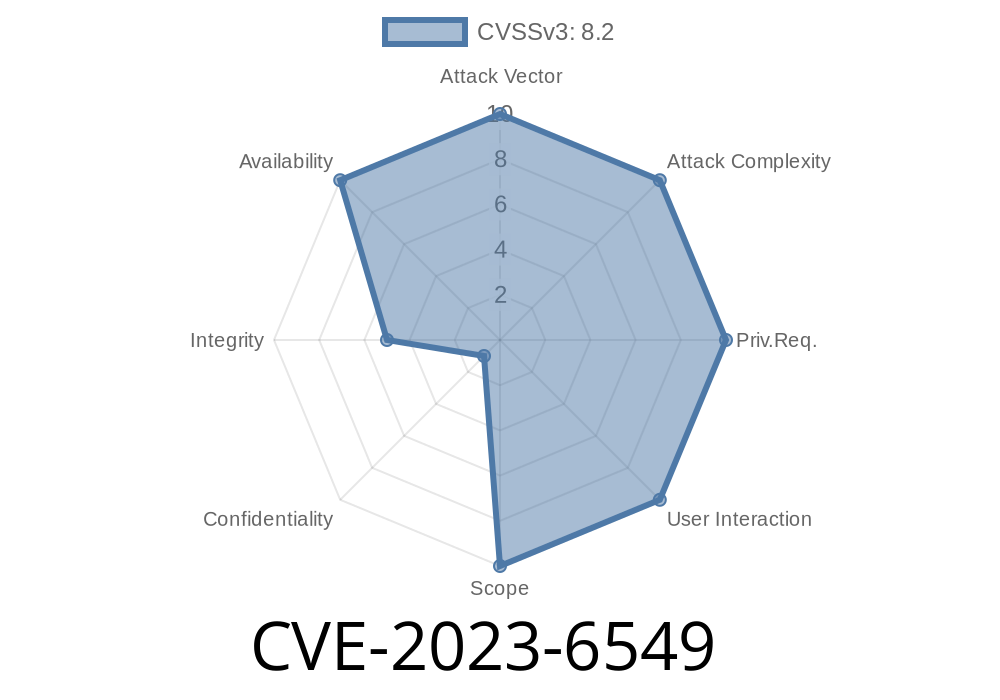In December 2023, Citrix acknowledged a major security vulnerability affecting their NetScaler ADC (formerly Citrix ADC) and NetScaler Gateway products. Labeled CVE-2023-6549, this issue allows remote attackers—with no authentication—to cause denial of service (DoS) on affected devices. If your organization uses these appliances in your infrastructure, you *need* to read and act on this vulnerability.
This article explains the background, demonstrates the core problem, outlines related exploit details, and offers practical guidance for mitigation. No jargon, no confusion—just what you need to protect your organization.
What Is CVE-2023-6549?
CVE-2023-6549 is a buffer over-read/overwrite vulnerability in NetScaler ADC and NetScaler Gateway. The core issue is improper restriction of operations within memory buffer boundaries. In simple terms, the software fails to properly check the length or boundaries of certain memory operations, opening the door for attackers to crash the service or make the device unstable—without ever needing to log in.
Why does this matter?
- Unauthenticated: Attackers don’t need credentials. They just need *network access* to the device.
- Denial of Service: The device can be forced offline, disrupting all applications and users relying on it.
Here’s How It Works (In Simple Terms)
NetScaler, like many network devices, receives and processes user input. If a malicious actor sends a specially crafted request with data that’s longer or shorter than what the device expects, the software tries to process memory areas it shouldn't touch. This can result in:
Potential data leakage or other unexpected behavior (though the main risk is denial of service)
> Example: Imagine you’re asked for a 5-digit PIN at an ATM, but you enter a 200-character string instead. Suppose the internal software tries to read all 200, ending up confused and crashing. NetScaler's vulnerability is like that, but with networking code.
Technical Details & Exploit Example
The vulnerability lies in the way NetScaler handles certain HTTP request parameters. Specifically, when the length of a field isn't properly checked before being used as an offset or buffer boundary.
Suppose a C-like pseudocode
void process_request(char *input) {
char buffer[256];
// Bug: Does not check input length! If input > 256 chars, this overflows.
strcpy(buffer, input);
// Process buffer ...
}
In this scenario, if an attacker sends a long string, the buffer overflows and can corrupt the program’s memory region, likely crashing the service.
Find the device: Use Shodan or Censys to find exposed NetScaler appliances.
2. Send a crafted request: Using Python and the requests library, send an HTTP POST/GET with an oversized parameter.
import requests
target_url = "https://vulnerable-netscaler.example.com/vulnerable-endpoint";
payload = "A" * 10000 # Oversized payload for buffer overflow
response = requests.post(target_url, data={'field': payload})
print(f"Status: {response.status_code}")
If the target is vulnerable, the service might crash, reset, or become unresponsive. There are public proof-of-concept scripts that perform this kind of test.
Revenue Loss: For SaaS providers or critical infrastructure, downtime means real financial loss.
- Risk of Escalation: While the known exploit focuses on DoS, improperly handled memory operations could sometimes be the first step toward remote code execution in other contexts.
Who Is at Risk?
Any organization with NetScaler ADC or Gateway exposed to the internet and running an unpatched version is at risk. This includes:
*Citrix’s Response*
Citrix has published security bulletins and urged users to patch.
- Citrix Security Bulletin for CVE-2023-6549
- Vendor NVD Entry
Download and apply the latest firmware or update from Citrix.
Network Segmentation
Restrict internet access where possible. Only allow trusted IP ranges to reach the management and application interfaces.
Test for Exposure
Use tools like nmap or online scanners to check if your public devices show the affected service endpoints.
Resources and References
- Official Citrix Advisory
- NIST CVE Details
- Twitter research thread from Shodan community
A more technical walk-through, with exploit code, may be found on communities like Exploit-DB or GitHub.
Conclusion
CVE-2023-6549 is a dangerous, easy-to-exploit vulnerability affecting a critical networking backbone used by thousands of organizations. It only takes minutes for attackers to knock devices offline. If you run NetScaler ADC or Gateway, patch immediately, restrict access, and monitor for outages.
Stay updated. Don’t let your service become an easy target.
If you want more technical details, real-world examples, or help with mitigation, feel free to ask below!
Timeline
Published on: 01/17/2024 21:15:11 UTC
Last modified on: 01/19/2024 02:00:01 UTC
